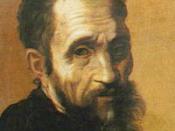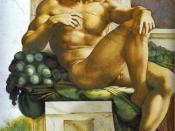All his life Michelangelo professed to think of himself as a sculptor rather than a painter. In fact he was not a painter in the sense of such great artist as the Dutch and Flemish painters of the seventeenth century. Michelangelo used to say that sculpture was the lantern of panting, and the difference was like the sun and moon. Michelangelo believed sculpture required more judgment and precision, it was harder work. Even in his old age he disliked the manual arts and a distaste for painting. He signed all of his work Michelangelo the sculptor.
Yet, of all Michelangelo's more ambitious projects only those in painting were completed by his own hand, while his many sculptural designs ether survive in bad condition or were never even started. And, despite his disregard for the fundamental of painting, he was one of the greatest painters who ever lived. In content and form, in piercing intensity of feeling and beauty of mass and line.
Michelangelo was a character of conflict. He broke away from his family to seclude himself and focus on his art. He lived for years in extreme privation in order to devote almost the entire income from stone-carving to the re-establishment of the family fortune and honor. He loved his father and brothers and poured out earnings for there well being, but berated them unjustly. He was a republican and challenged public officials. But when the chips were down he fled or hid, and in political danger recommended the strictest concealment of political opinion. He professed undying love for Tommaso Cavalieri, yet entertained other emotional interests. He was always a strict Christian, devoted to God and the Church and scornful of false priests.
There is, undeniably a certain grandiosity about Michelangelo, illustrative yet tragic. Michelangelo signed many contracts-...


